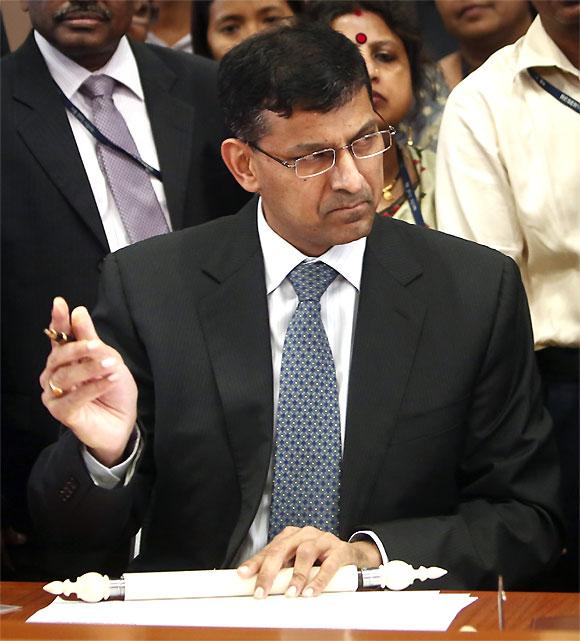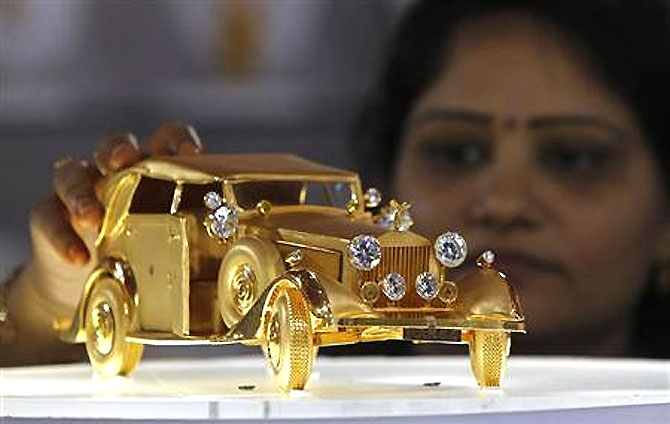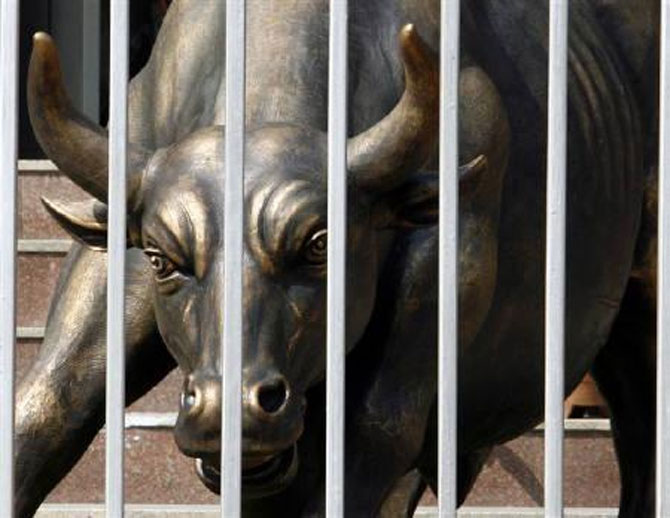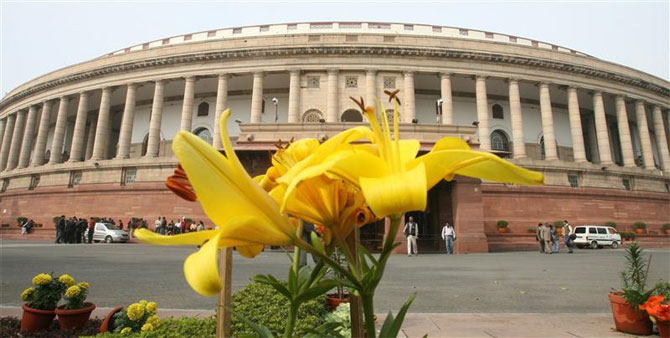
The immediate challenge to faster growth is to restore stability to the currency markets. After this, wholehearted focus should turn to reviving the economy’s broken growth machine, says Rajiv Lall.
Listening to Reserve Bank of India (RBI) Governor Raghuram Rajan’s refreshing speech, I was reminded of a 1970s French satire about the Chinese invasion of Paris in which a sombre protagonist declares reassuringly to panicked colleagues: “la situation est grave, mais pas desesperee!”
Indeed our situation today is serious. But it is, as the governor implied, hardly hopeless.
In fact, as I argue below the situation is quite salvageable but will require determined action. To make the case let us examine the political economy of the gainers and losers from the sharp correction we have seen in currency and capital markets.
Click on NEXT for more...

The household sector is sitting on the largest privately-held gold stock in the world. The rupee value of this stock has just seen a windfall gain of about 20 per cent.
Ownership of gold is also significantly more widespread than ownership of equities, retail penetration of which remains rather modest. So what if stock prices have been battered?
The net-wealth effect for the average Indian household is still likely to have been significantly positive.
Moreover, the evidence suggests that the inflation pass-through of a depreciating rupee is likely to be muted and will in any case take hold with a lag*, especially when it comes to the consumer price index (CPI), the inflation index that is much more relevant to the purchasing power of the Congress party’s core political constituency.
* International Monetary Fund Staff Working Paper, 2010
Click on NEXT for more...

Similarly, the micro small and medium enterprises sector, which reportedly accounts for 43 per cent of our manufacturing exports and 30 per cent of non-agricultural employment, should be a net beneficiary from the currency depreciation, and should be largely unaffected by developments in the equity and debt capital markets.
On the other hand, the impact for medium and large sized coporations is certainly negative. Their balance sheets will no doubt take some hit. But even here there are two important mitigating factors.
First, the bulk of un-hedged foreign currency borrowing by Indian corporations is from Indian banks. In order to protect themselves from possible defaults, these banks will find ways of refinancing their clients’ foreign currency debt with rupee financing in the coming months. The prospect of a large-scale cross-border default of Indian corporate debt for now seems remote.
And, the impact of whatever corporate dislocations have taken place so far are expected to be at least partly absorbed into the banking system’s balance sheet, which although weakened, still should not to be fatally wounded as a result.
Second, although this segment of corporate India accounts for a disproportionately large share of all borrowing and investment, its share in total non-agricultural employment is very modest.
As long as the agriculture sector holds out on the back of a good monsoon, the employment impact of the market disruptions will remain muted for some time.
Click on NEXT for more...

Ironically, potentially the largest and economically most damaging impact of the correction in currency and capital markets would be for the government itself.
The government will immediately see a rise in its borrowing costs; it will find it harder to meet its revenue targets from disinvestment; and the cost of a range of subsidies, especially those connected to oil imports, will rise.
Moreover, with slower gross domestic product growth, tax revenues are already falling short of target. All of this will make it tough for the government to stay the course on the fiscal consolidation that it has promised even as it prepares for elections. But the credibility of government on this issue is within its own control.
Based on the above I would argue that the government still has political space for manoeuvre. There is no need for panic. Nor, however, is there any reason for complacency.
Click on NEXT for more...

The immediate challenge is to restore stability to the currency markets. This must take priority overall else, including measures to revive growth. Only once stability is restored should wholehearted focus turn to reviving the economy’s broken growth machine.
I would recommend that in the run-up to elections the government focus first on implementing a few well-targeted, politically deliverable measures to assure markets that the current account deficit (CAD) is fully funded and that it is shrinking smartly towards a more sustainable level. With this in mind, my suggestions for immediate action are the following:
Stop using reserves to intervene in spot currency markets — fighting the market through direct intervention from a position of fundamental structural weakness is pointless.
It would be much more effective to announce that reserves will be made available to meet all our obligations on the current or capital account. The financing gap for a projected $70 billion CAD this fiscal is an estimated $25 billion. Our reserves position is large enough to comfortably absorb this.
Defer any cuts in short-term interest rates until stability returns to currency markets, the CAD on a 12-month run rate basis has shrunk to sustainable size, and CPI inflation is on a downward trajectory. This is important to drive real deposit rates higher and induce a rise in financial savings.
Reinforce the prime minister’s announcement that no further capital controls will be introduced. Stop making loose statements about rationing petrol or curbing non-essential imports. Effective communication is very important. Only designated spokespersons should be authorised to communicate to media on economic policy.
Click on NEXT for more...

Mitigate the fiscal impact of currency depreciation by allowing pass-through pricing for petrol, diesel and LPG, the cost of which is of much greater concern to the urban middle classes than to the Congress party’s target vote bank in rural India, which is presumably more sensitive to the price of fertiliser and kerosene.
Stick as closely as possible to the announced target for fiscal consolidation, even cutting Plan expenditures if necessary. In the game of winning back the trust of markets the government cannot compromise its credibility on this issue.
Pursue the issuance of an non-resident India bond. Even a few billion dollars collected through such an instrument would help sentiment and fill a part of the unfinanced gap.
Explore options to facilitate the voluntary conversion of privately-held gold into government gold reserves.
Engage the state governments concerned and judiciary to facilitate the speedy resumption of iron ore exports.
Build consensus for getting good and services tax (GST) legislation passed.
Rescind the last Budget’s provision on retrospective taxation.
Sort out issues pertaining to spectrum pricing and allocation.
Barring the GST and the retrospective tax amendment, none of the above measures requires legislative action. But with signs over the past few days of pragmatic deal-making, it may even be possible to progress on this front. If only government would now grasp the nettle.
Rajiv Lall is executive chairman, IDFC.